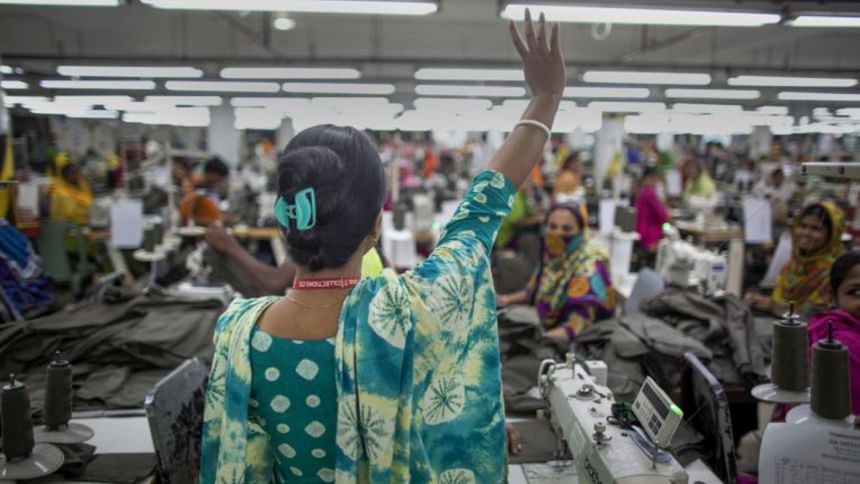Not Giving Up

Back from the UNGA. In the last 5 months and 10 days that I have been serving as president of Bangladesh Garment Manufacturers and Exporters Association, my brain has been on an overdrive. Waking up at 4:00 am has been routine; worrying about the industry that has been fuelling employment and economy of the country has been key. Luckily, my children are my guardians checking up on my sleeping habits, my health, my compulsions, my diary and our business. I am a lucky mother of 4.
So far I have been on four official trips. Japan was the beginning, followed by China, Brazil and New York. The Japan trip with our current ambassador was a breeze. With 22 CEOs of companies that invest in Bangladesh and continue being a friend of our nation, the conversation revolved around infrastructure and ultimately ended up being the biggest pledge for FDI in Bangladesh.
Next came Dalian in China, where the conversation was more on Asean. With Asean turning out to be the world's 4th largest economy by 2030, sky is the limit for us and hence, my proposal at Asean was positioning ourselves as Asean+1.
Next came Brazil. Brazil and Bangladesh have a bilateral trade of 1.5 billion dollars, out of which Brazil exports USD 800 million worth of sugar and we export only USD 163 million of readymade garments to them, taxed at 35 percent in Brazil. The idea was to attempt to ease into a somewhat trade preference mode leading to an FTA, at some point of time in the future. These things take time involving detailed study into the potential and the problems, with an effective follow up for both sides to stay engaged in.
Not giving up.
The fourth trip was, of course, to the UNGA, where during the side events, meetings with US policymakers, think tanks, trade union representatives, one thing became clear: the labour narrative is yet to be addressed. In spite of our export to the US growing, after new tariff lines being imposed by the US on China with effect from September 1, the discourse around trade still continues to be steeped into past references of abuse, termination, etc. Backing it up with promises and sound argument and yet doing the best will continue to be a challenge.
But, not giving up.
What else am I not giving up on? Let me candidly share the challenges that we have in the sector.
In the last 5 months, more than 40 factories have closed down and over 25,000 workers have lost their jobs. Yet, the growth figure seems to continue to impress all. A four-year CAGR indicates a dip in prices, lack of product diversification or up-gradation, and uncertain global sourcing trends. Big orders are ceasing; smaller runs are on the rise. The appeal of the bulk is being quickly replaced by more conscious and custom-made choices. Meantime, over capacity is also an issue to be examined deeply with a more focused study on developing a base national capacity, which will disallow us from undercutting each other and allowing our customers to pick the lowest bidder. The race to the bottom has to end.
Not giving up.
However, what bothers me about our growth narrative is that the big are growing bigger and the small are perishing. This puts a dent in my faith in the possibility of having new, young entrepreneurs popping up the manufacturing landscape. This means the economics of the developed world has won and that we have succumbed to the usual. Well, we have not. Today is a time for the unicorns, the new gazelles, the start up's that will further the pace of our land. This is a place where small firms with limited production capacity can actually promise a new growth in the changed pattern of consumers where big factories fail to comply with customisation and where small factories could actually cater to such demands.
How do we turn them around and make them compliant? We could. In this journey, national monitoring already is the first critical step for Bangladesh having our own codes, own practices, own standard of sustainability, which would take us to the new level of authority and credibility. Thus, in September, with fall at its peak, we pledged to peak our commitment to sustainable and collaborative national monitoring with the formation of Readymade Garment Sustainability Council. The timing has never been better.
What else could improve though? Perhaps a generous dose of policy support? A quick look at our competitors should be enough for any policymaker to rethink and reset the thought button. Recently, the Indian government has announced a 4 percent incentive under the Merchandise Exports from India Scheme; For Vietnam, corporate tax is at 0 percent for first 4 years, 50 percent for the next 9 years and 10 percent for the following 15 years. Pakistan's central bank now offers 7.5 percent interest against Export Refinancing Scheme.
At our end, with prices plunging, with the country concept being a provider of basics, with growing and enviable advantages being offered in neighbouring countries, with patterns of sourcing changing, we need to immediately consider strengthening our bargaining power by being together as manufacturers and offering an acceptable price to our buyers and understanding that being cheap is not sustainable, but being competitive is. We need to also flaunt our capabilities to the brands and tell them firmly that there's nothing we can't produce in this country of ours. To our policymakers, we must ensure that our data is not misunderstood or misinterpreted and that only one month of September peaking in 2018 impacted the entire year's increase and that…alas, it is not what they think it is.
My job as the president of BGMEA, the RMG exporters' association, so far has been to work with entrepreneurs who have been engaged in this trade for years, engaging in constant fears of falling prices and failing industrial units. There are closures and there are failures. Amidst all this, my job essentially is just not to firefight our dark nights into a more tolerable tomorrow's, but to essentially raise the bar of hope.
But, any unfavourable policy, any lack of encouragement will not only halt the industry but will also pose an immediate threat to the massive employment that this sector provides. In the last 5 months, more than 40 factories have closed down and more than 25,000 workers have lost their jobs. In brief, we are not doing well.
But we are not giving up.
At a recent conference in Harvard titled "Bangladesh Rising" organised by the Lakshmi Mittal South Asian Institute, in front of an august audience of academics, what was evident was that we are a nation with rapid transition positioned to take off with a distinctive 8.2 percent GDP model, with 165 million people living in a nation no bigger than the state of Wisconsin, and that we are secular and democratic, efficiently addressing challenges in both private and public sectors.
It was also evident that Bangladesh is just not rising anymore. Bangladesh has arrived. Thus…
Not giving up. Ever.
Dr Rubana Huq is the President of BGMEA and the Managing Director of Mohammadi Group.
Her Twitter handle is @Rubanah.

 For all latest news, follow The Daily Star's Google News channel.
For all latest news, follow The Daily Star's Google News channel. 



Comments